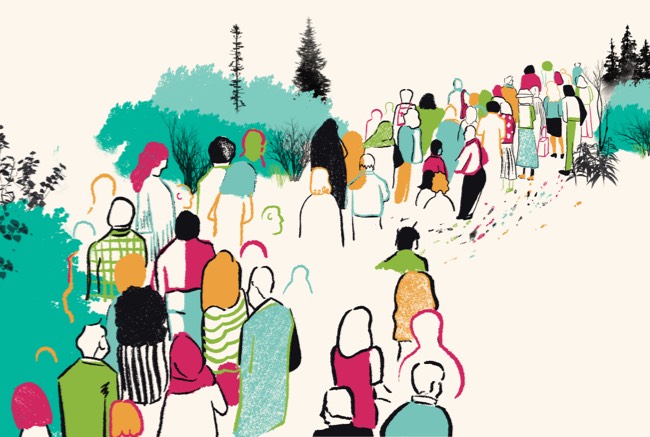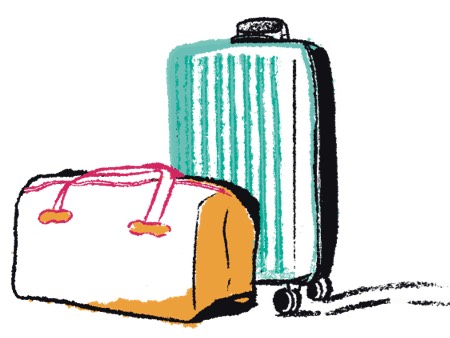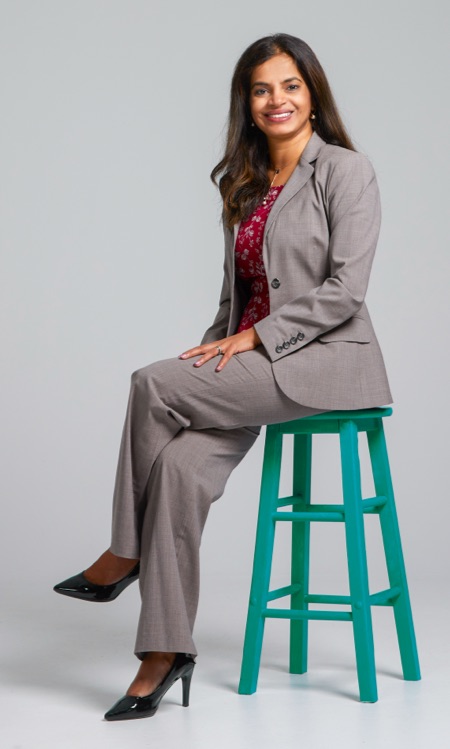Coming to Canada

What's it like being a newcomer in a foreign land? How do immigrants reconcile their new home from their old one? As Canada bolsters the number of immigrants it takes in over the coming years, we asked Gayathri Shukla, EMBA’19, to delve into these questions and more. Shukla recently worked with more than 30 women to tell their stories of immigration to Canada, which were published as an anthology. In this essay, she writes about that journey, her own experience as a newcomer and the lessons she learned along the way.
“Do you remember the first time you thought about moving to Canada?” Last year, I posed this question to more than 35 women taking part in a storytelling workshop I was leading over Zoom.
“Or, if you were born in Canada,” I continued, “do you remember the first time you realized that your family came from somewhere else . . . the moment you knew there was another home?”
A palpable pensiveness fell upon the virtual room. We were about to begin our journey.
Over the next few months I would lead this group, who had come from all over the world to Canada, on a literary odyssey. Through a series of workshops, I would ask them to unearth memories— some cherished, some bitter—to capture the life-changing experience that is immigration, and then write them in their own 1,000-word story.
I had so many questions for them to answer: What was your home like? What do you remember most about your country, your family, the food, your friends growing up? How did you find your way to Canada (and why Canada)? What obstacles have you faced here? And how do you feel looking back on it all?
My goal was to take their stories and compile them into a book that would tell a more intimate tale of immigration than we often hear in the headlines. Landed: Transformative Stories of Canadian Immigrant Women was published last fall. There are 37 chapters. Each is a person’s life—a story of someone who came to Canada, told in her own words. But these are just a few stories among millions happening right now.
Finding a new home
Canada is a nation of immigrants. That’s what we’re always told. And it’s true— even today. Especially today. Twenty- three per cent of people in Canada are immigrants, according to the latest census. That’s the highest share ever. (The previous record was in 1921 when, after a flurry of immigration from Europe, it reached 22 per cent.)
Today, people come from all over the world to live here. Immigration has shaped this country—powered its growth even—and will continue to do so. Last November, the federal government announced that it was ramping up immigration by bringing up to 500,000 newcomers a year to Canada by 2025. That’s double recent targets of around 235,000. Within 20 years, immigrants could represent anywhere from 29 to 34 per cent of the population.
We often talk about immigration in big numbers like these. But 500,000 immigrants equals 500,000 individual stories of happiness, sadness, longing, opportunity, setbacks, hard work, sacrifice and resilience. If we truly want to welcome immigrants, shouldn’t we understand what they’ve gone through? That’s what I hoped to do by anthologizing the stories of women immigrants.
Of course, to tell their story, I must also tell mine. That’s because I’m an immigrant too. In fact, I’ve moved twice to different countries. I was born in India and, when I was three, my parents moved our family to Saudi Arabia (owing to my father’s work as an engineer.) But Saudi Arabia offered limited opportunities for a young girl like me. I wasn’t allowed to pursue higher education or even drive. Then came the Gulf War. I remember air raid sirens and having to put on gas masks at school.
We moved to Canada in 1998 when I was 15. I still remember the plane touching down in Calgary. It was a beautiful August afternoon. We were immigrants, but this time things were different. In Saudi Arabia, we were segregated from the homegrown population. In Canada, we were expected to integrate. My brother and I quickly adapted our English to the Canadian accent and traded words like “queue” and “rubber” for “lineup” and “eraser”.
I fell in love with Canada but things weren’t always easy. Though my dad’s experience as an engineer had allowed us to get into Canada, once here he couldn’t find a job in his field; he was repeatedly told he lacked Canadian work experience. So, in his 40s, he returned to university to study software technology. My mom’s chemistry degree also didn’t land her a job. She ended up working entry-level cashier and bank teller jobs.
I did well enough in high school that I got into an advanced program called International Baccalaureate. But a family friend cautioned me: “Immigrant? Better work twice as hard.” For me, that wasn’t a problem. I was always willing to do what it took to succeed. And I did. I went to the University of Calgary to study engineering on a scholarship. Then I headed to Fort McMurray as one of the few women of Indian origin working in the oil and gas industry there. Eventually, I returned to Calgary to continue working in the energy sector. That is, until I decided to make storytelling my career.
Two suitcases
My journey with storytelling started first as a pandemic passion project. The idea was sparked during my EMBA New Ventures class. I wanted to help leaders better appreciate diversity and build more inclusive cultures. Diversity and inclusion (D&I) is not new. Its business case is well established. But my experience with D&I efforts had revealed a crucial gap: many failed to get implemented or adopted into organizational culture. A more intuitive, human-centred approach was needed.

This led me to certify in a method of storytelling called guided autobiography, an evidence-based way of helping people recollect and share their lived experiences in group settings. I began hosting workshops using this method for companies and colleges. I witnessed how the power of storytelling enabled teams to break down walls, regardless of their background, and build bridges of shared understanding, trust and respect.
In fall 2021, I founded Campfire Kinship Storytelling Inc., trading my 17-year corporate engineering career for entrepreneurship. At the time, I was also volunteering as a board director at the Calgary Immigrant Women’s Association. I had a hunch that what I knew about immigrant women’s stories was not told or heard broadly enough. I proposed the anthology idea to Calgary Arts Development and was grateful to receive their grant funding.
Nothing could have prepared me for the response to our call for applications. Countless women and gender-nonconforming folks in Calgary expressed interest in being part of the anthology. (I can’t help but wonder about the wealth of stories waiting to be told across Canada.) Selected participants represented 30 countries of origin with varying immigration pathways: international students, skilled workers, family members and refugees. Some were born in Canada to immigrant parents. But all shared one desire: to leave a legacy in the form of a written story.
There was Anna Zakharova, for example. Today, she’s a family school liaison worker in Edmonton who loves snowboarding. But nine years ago she was living in Crimea. Then the Russians invaded and Anna and her family had to flee. “I was not upset about leaving,” she recalls in her chapter, called “Two Suitcases”. “Rather, I feared being detained by Russian paramilitary and tortured like the co-ordinator of our protest movement in Crimea. Or being found dead in a ditch...”
In Canada, she studied community social work, but like so many immigrants had a hard time getting hired. For a while she worked in a homeless shelter, noting that most of her co-workers were immigrants, too. “They came here for a better future for their children in a democratic country. However, the price was to be stripped of their former social status, education and work experience.” Anna found joy in volunteering with the local Ukrainian community. But she still dreams of returning to Crimea to collect the family albums that did not fit in the two suitcases she fled with.
Then there was Kelly Kaur, born in Singapore and who recalls her neighbours as “Malays, Chinese, Indians and others from around the world.” Kelly came to Canada as a student and was suddenly a visible minority. “I found out that to be an immigrant is to forever be caught up in an insider-outsider dance.”
Kelly felt the pressure to succeed as an international student but said it’s often small things that are disorienting for newcomers—the loss of familiar foods or dealing with four seasons for the first time. In the end, she writes that being an immigrant is to “live a dual life of negotiating the best and the worst from one tradition, culture, country, and harmonize it with my new country.”
Lessons Learned
As project lead and workshop facilitator, publishing this book of stories was a labour of love for me. It has gifted me with insights and takeaways on what it means to be Canadian, which I would like to share with you.
The first takeaway is about identity and honouring your roots. Admittedly, this isn’t the type of thing that makes it to the top of people’s lists. Truth be told, I loathed the times I’ve been randomly asked, “Where are you from?” It’s an innocuous question, but as a visible minority, it has an othering effect on me: Will I ever be “Canadian enough,” despite Canada being my home for 25 years? In my opinion, framing a question around a person’s heritage is a better approach, once you’ve gotten to know them a bit.
Putting pen to paper for my story in Landed (titled “Jasmine Flowers”), helped me reconcile a part of my identity that I had grappled with since moving to Canada. My name is Gayathri, which my grandmother gave me at birth.

Gayathri Shukla: "I had a hunch that what I knew about immigrant women's stories was not told or heard broadly enough"
“Jasmine Flowers” is about my late grandmother who was not allowed the opportunity to pursue her dreams of higher education. But she always encouraged me to pursue mine. It’s a big reason why my parents decided to come to Canada. Although my name is common in India, it is difficult to pronounce in Canada. I have been advised to shorten or anglicize it. Studies have shown that foreign-sounding names receive fewer job interviews than English-sounding ones.
Still, I chose to keep my name. I now let everyone know it’s OK if they falter with its pronunciation. I will help them get it right, and I want to get their names right, too.
My point is this: our names, our family heritage and our stories form integral parts of our identity. It takes courage to look inward and to hold space for the parts of you that you felt you had to hide or cast away. Give yourself permission, anyway. Reclaim your truth, and do it in a way that feels authentic to you.
The second takeaway relates to privilege—a loaded word for its effect in triggering guilt or defensiveness. But when you compile a set of stories as diverse as those in Landed, it is hard to un-notice patterns of inequity and privilege.
It was disturbing but not surprising, for example, to see that many participants of Asian and African descent in Landed faced racism versus those of European descent. I also noticed a painful theme around uneven access to opportunities experienced by refugees, versus those who had a choice to immigrate (and were thus able to bring with them their bank balance or command over English or French). Nevertheless, every story is a testament to overcoming adversity and unlocking the personal power to transform and grow, despite systemic barriers.
One such example is in the story “Magic of Kindness”, where my co-author, Elena Esina, describes her transformation into wanting to help others: “Because of those [kind] strangers, I have been giving back ever since that first smile at the gate.” Or, Anusha Kassan’s story, “The Seemingly Impossible Quest and Longing for Change”. Anusha sheds light on her relentless pursuit for equity in her profession of psychology: “Until true, systemic change takes place, and racist, discriminatory, unjust structures are dismantled in our society, I know I will not be able to rest.”
The idea here is not about cross-examining who has more privilege or less. I believe the real question is: What do we do with the privilege we have? It is a question I hope will inspire more of us to reflect upon our individual power to affect change. It is how we will be remembered in the end.
Given a chance
My third takeaway connects to the universal human need for belonging. I was fortunate to experience it during the storytelling process itself, but it didn’t come easy. I learned that the act of reflecting on what home means to you can shatter your heart open. This was intensified by timing—the horrific invasion of Ukraine was transpiring just as we submitted our first book drafts in February 2022, triggering memories of trauma for those who had experienced war and displacement in their lives.
Census says: immigration in Canada

1 in 4 people in Canada in 2021 were immigrants or landed residents

1 in 3 people in Canada will be immigrants or landed residents by 2041 if trends continue

56.3% of recent immigrants were admitted for economic reasons

from 2016 to 2021, immigrants accounted for 80% of labour force growth in Canada

218,430 refugees were admitted as permanent residents to Canada from 2016 to 2021
At the same time, I learned how we can rebuild the pieces, one by one, thus emerging fiercer, kinder, and truer to who we are. Our workshops became a place of safety, of releasing pain, of transcending borders, of solidarity, of declaring our joy and power, and of healing. It culminated in a grand moment on stage celebrating the success of our book launch, while seeing first-hand just how much representation matters.
My hope for everyone is that you find your way to belonging too, no matter who you are and whether that be through storytelling or otherwise.
The American writer and transgender rights activist Janet Mock, the author of Redefining Realness, once said, “Telling our stories, first to ourselves, and then to another, is simply a revolutionary act.” Inside the stories in Landed and through these women, I discovered a kind of grace and determination I had never witnessed before.
What I want all Canadians to know is that ultimately, immigrants who come to Canada just want to be given a chance. And I believe that what my story and so many other stories go to show is that when given the opportunity, our potential is truly transformative.
